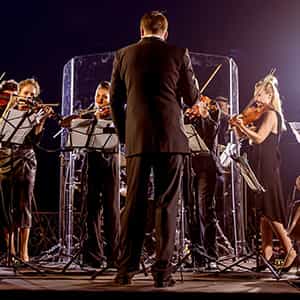

Brahms Symphony No. 1 Tickets
No Buyer Fees on Brahms Symphony No. 1 Tickets and Up to 30% Off Compared to Competitors. Learn More →
Select Location (e.g, New York)
Events Nearby
- Feb 28, 2026SAT•7:30 PMFeb28sat7:30 PM - Orlando Philharmonic Orchestra: Brahms Symphony No. 1Dr. Phillips Center - Steinmetz Hall, Orlando, FL●81 Tickets Left!
- Mar 1, 2026SUN•2:30 PMMar1sun2:30 PM - Orlando Philharmonic Orchestra: Brahms Symphony No. 1Dr. Phillips Center - Steinmetz Hall, Orlando, FL
Brahms Symphony No. 1 Cities & Venues
Frequently Asked Questions About Brahms Symphony No. 1 Tickets and Events
What makes Brahms Symphony No. 1 a significant piece in classical music?
Brahms Symphony No. 1 is considered significant because it showcases Brahms' mastery of orchestration and form, often regarded as a response to Beethoven's symphonic legacy, blending Romantic elements with classical structures.
Who typically performs Brahms Symphony No. 1?
Brahms Symphony No. 1 is often performed by symphony orchestras, chamber orchestras, and professional ensembles, featuring a conductor and a full orchestral complement.
What are some common interpretations of Brahms Symphony No. 1?
Common interpretations of Brahms Symphony No. 1 vary widely, with conductors bringing their unique insights into its emotional depth, tempo choices, and dynamic contrasts, leading to diverse performances.
What should I listen for when attending a performance of Brahms Symphony No. 1?
When attending a performance of Brahms Symphony No. 1, listeners should focus on the thematic development, the use of motifs, the interplay between different sections of the orchestra, and the emotional arc of the piece.
What is the historical context of Brahms Symphony No. 1?
Brahms Symphony No. 1 was composed over a period of 14 years, from 1855 to 1876, during a time when Brahms was establishing his reputation in a musical landscape dominated by Wagner and the Romantic movement.
How is Brahms Symphony No. 1 structured?
Brahms Symphony No. 1 is structured in four movements, following the traditional symphonic form, with a rich blend of lyrical melodies, intricate harmonies, and a climactic finale that captures the symphony's essence.
What are the key themes explored in Brahms Symphony No. 1?
Key themes in Brahms Symphony No. 1 include struggle and triumph, with motifs representing conflict and resolution, as well as a deep emotional resonance that reflects Brahms' personal experiences and artistic vision.
Are there any notable recordings of Brahms Symphony No. 1?
Yes, there are many notable recordings of Brahms Symphony No. 1 by renowned conductors and orchestras, each bringing their unique interpretations, including those by Herbert von Karajan, Leonard Bernstein, and Gustavo Dudamel.
How does Brahms Symphony No. 1 compare to his other symphonies?
Brahms Symphony No. 1 is often compared to his later symphonies due to its innovative orchestration and emotional depth, marking a transition in his compositional style that blends classical traditions with Romantic expressiveness.
What impact has Brahms Symphony No. 1 had on modern orchestral performances?
Brahms Symphony No. 1 has had a significant impact on modern orchestral performances, influencing both repertoire choices and performance practices, as well as inspiring generations of composers and musicians to explore similar thematic complexities.

